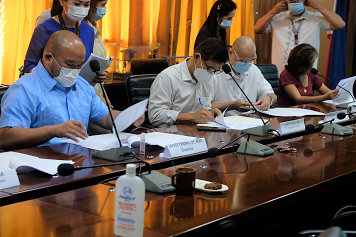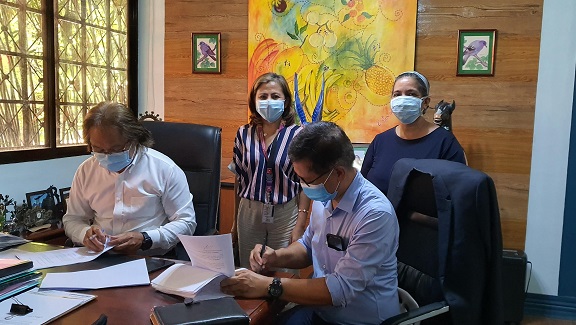UP Mindanao/ PGC Mindanao to help establish Davao de Oro COVID-19 testing facility

The University of the Philippines (UP) Mindanao will help set up another COVID-19 testing facility in Davao de Oro Province, signing a memorandum of agreement with the Provincial Government and the Department of Science and Technology Region XI last 22 June 2020 at the Provincial Capitol in Nabunturan, Davao de Oro.
UP Mindanao Chancellor Prof. Larry Digal, Davao de Oro Governor Jayvee Tyron Uy, and DOST XI Assistant Regional Director Kenneth Barroga signed on behalf of their government institutions. Philippine Genome Center Mindanao Director Prof. Lyre Anni Murao and Davao de Oro Chief of Hospitals Dr. Ferdinand Anthony Soberano were witnesses to the agreement.
The facility, to be set up in the Provincial Hospital in Montevista Town, will be used to test patients, frontline workers, and other individuals for COVID-19 once accredited by the Department of Health (DOH). The service can also be extended to nearby provinces. The facility can also serve as a surveillance and research center for other infectious diseases.
Chancellor Digal thanked Governor Uy for giving UP Mindanao the opportunity to assist the province against COVID-19. “It is a good opportunity to share the commitment of UP Mindanao and the expertise of Dr. Lyre Murao and her team in the Philippine Genome Center Mindanao and to partner with the DOST, the funding agency of PGC,” he said.
UP Mindanao will provide training in molecular diagnostics and biosafety for personnel who will operate the Davao de Oro facility, as well as help in designing the facility following DOH guidelines, develop a manual of operations, and give technical assistance in the accreditation process. The university will also provide consultancy services for technical issues that may arise during regular operations of the facility and formulate programs for the expanded use of the facility in infectious disease surveillance and research.
For this initiative, the DOST XI will provide financial support for the training of personnel for the facility. Assistant Regional Director Barroga described the Davao de Oro leadership as “agile and innovative” in responding to the needs of its people and offered the services of the DOST Regional Health Council in funding projects “not just for COVID-19 but other infectious diseases as well.”
The Provincial Government will design and construct the facility, procure the laboratory supplies and equipment to be used in the facility, apply for DOH accreditation, and serve as the fund manager. It will spearhead the sample collection and storage and take charge of the facility’s maintenance and operation.
Governor Uy said it was timely that UP and DOST came in when President Duterte gave the Bayanihan funds for the province. “It’s one less worry, and hopefully, the COVID-19 facility will be up and running by August,” he said.
UP Mindanao, through the Philippine Genome Center (PGC) Mindanao, also lent its expertise for a COVID-19 testing facility in Tagum City on 19 May 2020 and provided training for the personnel. UP Mindanao also entered into a strategic partnership with the Southern Philippines Medical Center on 26 May 2020 to train personnel who will operate other COVID-19 testing facilities in Mindanao. The PGC Mindanao is the training arm of the UP-DOH collaboration for COVID-19.
###
IN PHOTO:
Davao de Oro Governor Jayvee Tyron Uy, UP Mindanao Chancellor Ρrof. Larry Digal, Davao de Oro Chief of Hospitals Dr. Ferdinand Soberano, Ρhiliррine Genome Center Mindanao Director Ρrof. Lyre Anni Murao sign the Memorandum of Agreement for a COVID-19 testing facility in Davao de Oro.
Ρhoto courtesy of Ρhiliрpine Genome Center Mindanao

